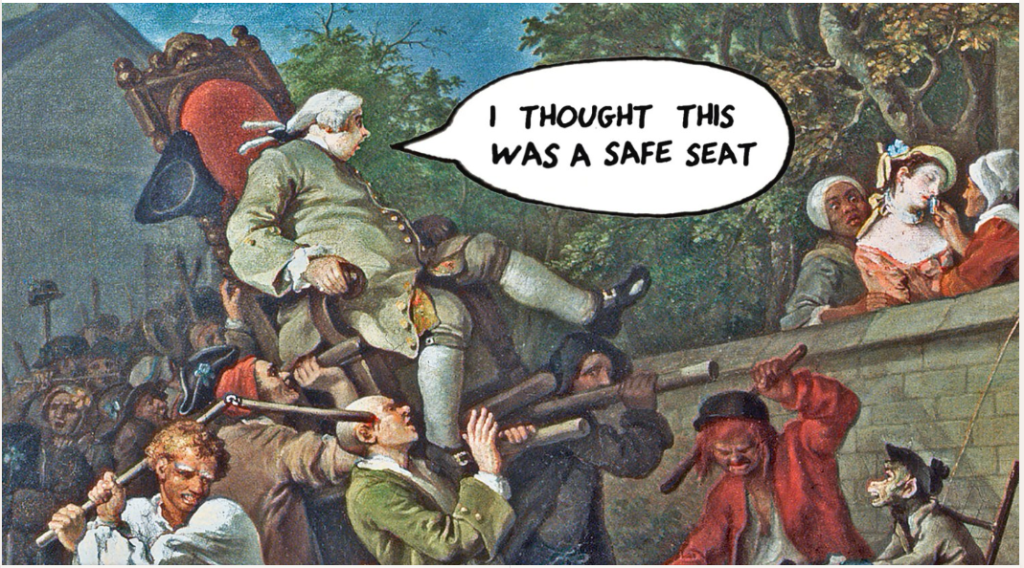Labour and the Conservatives would both leave the NHS with lower spending increases than during the years of Tory austerity, according to an independent analysis of their manifestos by a leading health thinktank.
Toby Helm www.theguardian.com
The assessment by the respected Nuffield Trust of the costed NHS policies of both parties, announced in their manifestos last week, says the level of funding increases would leave them struggling to pay existing staff costs, let alone the bill for massive planned increases in doctors, nurses and other staff in the long-term workforce plan agreed last year.
The Nuffield Trust said that “the manifestos imply increases [in annual funding for the NHS] between 2024-25 and 2028-29 of 1.5% each year for the Liberal Democrats, 0.9% for the Conservatives and 1.1% for Labour.
“Both Conservative and Labour proposals would represent a lower level of funding increase than the period of ‘austerity’ between 2010-11 and 2014-15.
“This would be an unprecedented slowdown in NHS finances and it is inconceivable that it would accompany the dramatic recovery all are promising. This slowdown follows three years of particularly constrained finances.”
The trust added that the planned funding increases “would make the next few years the tightest period of funding in NHS history”.
Sally Gainsbury, senior policy analyst at the Nuffield Trust and a leading authority on NHS funding, said: “They will struggle to be able to pay the existing staff, let alone the additional staff set out in the workforce plan. It’s completely unrealistic.”
A Labour spokesperson, when asked about the Nuffield Trust’s analysis, said the party would “deliver the investment and reform the NHS needs”.
They added: “Our £2bn investment will deliver 40,000 extra appointments a week on evenings and weekends, double the number of scanners, 700,000 extra emergency dental appointments, 8,500 more mental health professionals, and mental health support in every school and community. We’ll pay for it by clamping down on tax dodgers, because working people can’t afford another tax rise.”
The state of the NHS has played a key role in the election so far. Rishi Sunak last year promised to bring down waiting lists from a record high of 7.2m but there are now 7.5 million people waiting for treatment – a figure that rose again last week.
Labour has promised an additional 2m appointments a year, but the NHS currently carries out an annual total of 92m appointments, tests and operations.
Labour plans to cut waiting list times with weekend clinics, using spare capacity in the private sector and doubling the number of scanners to deliver faster diagnoses. It says its plan will cost £1.3bn, paid for by a crackdown on tax avoidance, but it is a small proportion of the annual NHS budget for England of about £165bn.
The analysis will add to a growing sense that neither of the main parties is coming clean with voters about the true implications of their tax and spending policies.
Paul Johnson of the Institute for Fiscal Studies said that for Labour to deliver the change it is promising there would need to be more money on the table. “Labour’s manifesto offers no indication that there is a plan for where the money would come from to finance this,” he said.
The findings come as leading NHS figures call for a Labour government to get serious about reform and funding of the NHS within its first 100 days in office.
Former Tory MP and chair of the House of Commons health select committee Sarah Wollaston, who announced last week that she was quitting as chair of NHS Devon over attempts to impose more spending cuts, called for Labour to change rules on capital spending that punish trusts that overspend by slashing their capital budgets.
“It is particularly perverse that you punish people who need it the most and actually take away some of their capacity to get back on track,” Wollaston said. “Systems like Devon desperately need more capital to be more efficient.”
She said a Labour government also had to address public health issues and the need for more emphasis on prevention,which had been neglected by the Tories since 2010. “We can’t afford to wait,” she said.The row over NHS spending comes as fresh analysis shows that Labour and the Tories may be on course for their lowest combined vote share since the second world war.
The latest Opinium poll for the Observer also shows a shift away from the main parties. Labour has maintained a dominant 17-point lead over the Tories with less than three weeks to go until polling day. However, Reform and the Lib Dems are up 2 points each.
A Tory spokesperson said: “The Conservatives have taken bold action to cut waiting lists and secure the future of the NHS, with the total budget increasing by over a third in real terms since 2010 and our £2.4bn long-term workforce plan – the first of its kind – delivering record numbers of doctors and nurses.”

